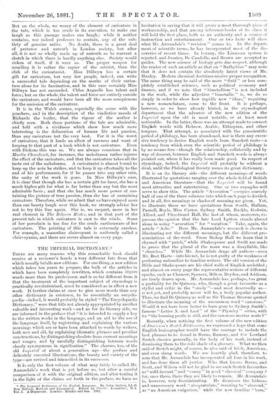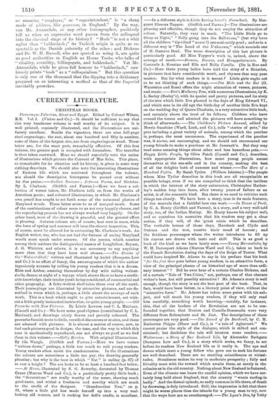THE IMPERIAL DICTIONARY . 1 ' THERE are many reasons why this
remarkable book should receive at a reviewer's hands a very different fate from that which usually befalls new editions. For one thing, a new edition ',which takes ten years to prepare, the bulk of the articles in which have been completely rewritten, which contains 30,000 words more than its predecessor, and is so far different from it that the treatment of the important subject of etymology is practically revolutionised, must be considered as in effect a new work. It further claims at once to give more words than any other dictionary iu existence, to be essentially an encyclo- pedia—indeed, it would probably be styled " The Encyclopsedic Dictionary," were that title not already appropriated by another valuable and interesting work—and as for its literary side, we are informed in the preface that " it is intended to supply a key to the written works in the language, and an aid to the use of the language itself, by registering and explaining the various meanings which are or have been attached to words by writers, both new and old, by explaining idiomatic phrases and peculiar constructions, by distinguishing obsolete from current meanings and usages, and by carefully distinguishing between words closely synonymous in signification." The charms, too, of the old Imperial of about a generation ago—the profuse and delicately executed illustrations, the beauty and variety of the type—are revived and intensified in its successor.
It is only the first volume of what may fairly be called Mr. Annandale's work that is yet before us, but after a careful comparison of it with the original edition, and after testing it in the light of the claims set forth in the preface, we have no
• The Imperial Dictionary of the English Language. By John Ogilvie, LL D. New Edition, Reviied and Augmented. Edited by Charles Annandale, M.A. Vol. I. A-Depascent. London: Blackie and Son. 1882.
hesitation in saving that it will prove a most thorough piece of workmanship, and that among reference-books of its class it will hold the first place, both as an authority and a source of instruction and entertainment. One or two facts will show what Mr. Annandale's " revision " conies to. In the depart- ment of scientific terms, he has incorporated most of the dis- coveries of recent times. in botany, the Linnwan system is rejected, and Jussieu, De Candolle, and Brown are accepted as guides. The new science of biology gets due respect, although the reader of such an article as that on " Bathybius " may note that it does not contain the absolutely latest views of Mr. Huxley. Modern chemical doctrines receive proper recognition. The same thing may be said of the more "fluid " or less com- pletely established sciences, such as political economy and finance, and if we note that "bimetallism " is not included in the work, while the adjective " bimetallic " is, we do so simply in order to show how rapidly new " ideas," requiring a new nomenclature, come to the front. It is perhaps, however, as we have already hinted, in the etymological department that the advance of the new edition of the Imperial upon the old is most notable, or at least most noticeable. In the latter, there was an attempt made to connect English words with Hebrew, Arabic, Ethiopian, and other tongues. That attempt, as associated with the prescientific period of philology, has been abandoned, nor is there any exces- sive tendency to derive English words from Sanskrit roots—a tendency from which even the scientific period of philology is by no means free—though the relationship, collaterally and by way of descent, between English and Sanskrit words is always pointed out, where it has really been made good. In respect of etymology, indeed, the Imperial will probably be without a rival, until the Philological Society issues its great dictionary.
It is on its literary side—the different meanings of words illustrated by quotations ranging over the whole field of British and American literature—that the Imperial will be found most attractive and entertaining. One or two examples will serve to show this. The article "Avocation " occupies scarcely half of one of the three columns into which each page is divided, and in all, five meanings or shades of meaning are given. Yet, to illustrate these we have quotations from South, Hallam, Parnell, Boyle, Miss Carter, Sydney Smith, Buckle, Godwin, Alford, and Fitzedward Hall, the last of whom, moreover, ex- presses the opinion that the late Lord Lytton stands almost alone in using " avocation " for " vocation." Take, again, the article " Ache." Here Mr. Annandale's research is shown in illustrating not the different meanings, but the different pro- nunciations of the word. From Bishop Hall we learn that it rhymed with "patch," while Shakespeare and Swift are made to prove that the plural of the noun was a dissyllable, like " churches." While Mr. Annandale drags all authors—even Mr. Bret Harte—into his net, he is not guilty of the weakness of preferring unfamiliar to familiar writers. The old version of the Bible and Shakespeare are his chief wells of English undefiled ; and almost on every page the representative writers of different epochs, such as Chaucer, Spenser, Milton, Dryden, and Addison, are freely drawn upon. Mr. Annandale has, perhaps, too great a partiality for De Quincey, who, though a great favourite as a stylist and critic in the "study "—and most deservedly Bo- is not yet, and probably never will be, a truly popular author. Thus, we find De Quincey as well as Sir Thomas Browne quoted to illustrate the meaning of the uncommon word " canorous." Would it not have been better to have gone to Sydney Smith's famous "Letter X. and Last" of the " Plyniley " series, with its " the burning pestle is still, and the canorous mortar mute ?"
Recently, when noticing the first volume of the new edition of Jamieson's Scotch Dictionary, we expressed a hope that some English lexicographer would have the courage to include the best phrases to be found in Burns, Ramsay, and the Lowland Scotch classics generally, in the body of his work, instead of dismissing them to the cold shade of a glossary. What we then said of Scotch might, of course, be also said of Irish, American, and even slang words. We are heartily glad, therefore, to note that Mr. Annandale has incorporated all four in his work, and has done them all justice. Who that knows Burns, and Scott, and Wilson will not be glad to see such Scotch favourites as" auld-farrant " and " canny " in good " classical " company ? for, once there, there they are likely to remain. Mr. Annandale is, however, very discriminating. He dismisses the hideous and unnecessary word " absquatalate," meaning to " abscond," as " an American vulgarism," while the now familiar " boss," as meaning " employer," or " superintendent," is " a slang mode of address, like governor, in England." By the way, can Mr. Annandale, or any other lexicographer, positively tell us when an expressive word passes from the colloquial into the classical stage of its history P " Bosh" is not a whit uglier than " balderdash ;" its Turkish origin is quite as re- spectable as the Danish paternity of the other ; and Dickens and Dr. W. H. Russell, who are quoted as using it, are quite as good authorities in English as Horne Tooke, who talks of ribaldry, scurrility, billingsgate, and balderdash." Yet Mr. Annandale, while he gives full honour to " balderdash," cau- tiously prints " bosh " as a "colloquialism." But this question is only one of the thousand that the dipping into a dictionary prepared on so interesting a method as that of the Imperial inevitably provokes.



































 Previous page
Previous page